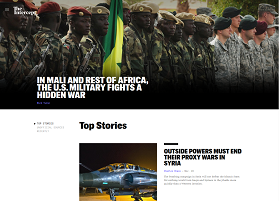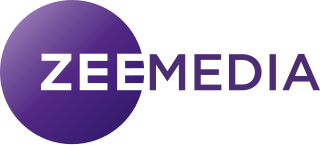Journalism is the production and distribution of reports on the interaction of events, facts, ideas, and people that are the "news of the day" and that informs society to at least some degree of accuracy. The word, a noun, applies to the occupation, the methods of gathering information, and the organizing literary styles.

Citizen journalism, also known as collaborative media, participatory journalism, democratic journalism, guerrilla journalism, grassroots journalism, or street journalism, is based upon members of the community playing an active role in the process of collecting, reporting, analyzing, and disseminating news and information. Courtney C. Radsch defines citizen journalism "as an alternative and activist form of news gathering and reporting that functions outside mainstream media institutions, often as a response to shortcomings in the professional journalistic field, that uses similar journalistic practices but is driven by different objectives and ideals and relies on alternative sources of legitimacy than traditional or mainstream journalism". Jay Rosen offers a simpler definition: "When the people formerly known as the audience employ the press tools they have in their possession to inform one another." The underlying principle of citizen journalism is that ordinary people, not professional journalists, can be the main creators and distributors of news. Citizen journalism should not be confused with community journalism or civic journalism, both of which are practiced by professional journalists; collaborative journalism, which is the practice of professional and non-professional journalists working together; and social journalism, which denotes a digital publication with a hybrid of professional and non-professional journalism. Seungahn Nah and Deborah S. Chung say in their book "Understanding Citizen Journalism as Civic Participation" that citizen journalism is "highly embedded in local communities where community residents engage in day-to-day routines of community storytelling about local politics, public affairs, community events, neighborhood issues, schools, public transportation, land uses and environments, and much more."
Fact-checking is the process of verifying the factual accuracy of questioned reporting and statements. Fact-checking can be conducted before or after the text or content is published or otherwise disseminated. Internal fact-checking is such checking done in-house by the publisher to prevent inaccurate content from being published; when the text is analyzed by a third party, the process is called external fact-checking.
Journalistic objectivity is a principle within the discussion of journalistic professionalism. Journalistic objectivity may refer to fairness, disinterestedness, factuality, and nonpartisanship, but most often encompasses all of these qualities. First evolving as a practice in the 18th century, a number of critiques and alternatives to the notion have emerged since, fuelling ongoing and dynamic discourse surrounding the ideal of objectivity in journalism.
Claims of media bias in the United States generally focus on the idea of media outlets reporting news in a way that seems partisan. Other claims argue that outlets sometimes sacrifice objectivity in pursuit of growth or profits.

Tehelka is an Indian news magazine known for its investigative journalism and sting operations. According to the British newspaper The Independent, the Tehelka was founded by Tarun Tejpal, Aniruddha Bahal and another colleague who worked together at the Outlook magazine after "an investor with deep pockets" agreed to underwrite their startup. Bahal left Tehelka in 2005 to start Cobrapost – an Indian news website, after which Tehelka was managed by Tejpal through 2013. In 2013, Tejpal stepped aside from Tehelka after being accused of sexual assault by his employee. Tehelka had cumulative losses of ₹66 crore (US$7.6 million) till 2013, while being majority owned and financed by Kanwar Deep Singh – an industrialist, a politician and a member of Indian parliament.
The Poynter Institute for Media Studies is a non-profit journalism school and research organization in St. Petersburg, Florida, United States. The school is the owner of the Tampa Bay Times newspaper and the International Fact-Checking Network. It also operates PolitiFact.

Zee News is an Indian Hindi-language right-wing news channel owned by Subhash Chandra's Essel Group. It launched on 27 August 1999 and is the flagship channel of the Zee Media Corporation.

Political journalism is a broad branch of journalism that includes coverage of all aspects of politics and political science, although the term usually refers specifically to coverage of civil governments and political power.

Arnab Ranjan Goswami is an Indian news anchor and journalist. He is the managing director and editor-in-chief of Republic Media Network.

Sharyl Attkisson is an American journalist and television correspondent. She hosts the Sinclair Broadcast Group TV show Full Measure with Sharyl Attkisson.
Churnalism is a form of journalism in which press releases, wire stories and other forms of pre-packaged material are used to create articles in newspapers and other news media in order to meet increasing pressures of time and cost without undertaking further research or fact-checking.

Open is an Indian English-language weekly magazine. It was launched on 2 April 2009 by the Open Media Network, the media venture of RP-Sanjiv Goenka Group. The current managing editor is P. R. Ramesh and the editor-in-chief is S. Prasannarajan. Previous editors were Sandipan Deb and Manu Joseph.
The International Business Times is an American online newspaper that publishes five national editions in four languages. The publication, sometimes called IBTimes or IBT, offers news, opinion and editorial commentary on business and commerce. IBT is one of the world's largest online news sources, receiving forty million unique visitors each month. Its 2013 revenues were around $21 million. As of January 2022, IBTimes editions include Australia, India, International, Singapore, U.K. and U.S.

The Intercept is an American left-wing nonprofit news organization that publishes articles and podcasts online. The Intercept has published in English since its founding in 2014, and in Portuguese since the 2016 launch of the Brazilian edition staffed by a local team of Brazilian journalists.

Fake news or information disorder is false or misleading information claiming the aesthetics and legitimacy of news. Fake news often has the aim of damaging the reputation of a person or entity, or making money through advertising revenue. Although false news has always been spread throughout history, the term fake news was first used in the 1890s when sensational reports in newspapers were common. Nevertheless, the term does not have a fixed definition and has been applied broadly to any type of false information presented as news. It has also been used by high-profile people to apply to any news unfavorable to them. Further, disinformation involves spreading false information with harmful intent and is sometimes generated and propagated by hostile foreign actors, particularly during elections. In some definitions, fake news includes satirical articles misinterpreted as genuine, and articles that employ sensationalist or clickbait headlines that are not supported in the text. Because of this diversity of types of false news, researchers are beginning to favour information disorder as a more neutral and informative term.

OpIndia is an Indian far-right news website known for frequently publishing misinformation. Founded in December 2014, the website has published fake news and Islamophobic commentary on numerous occasions. OpIndia is dedicated to criticism of what it considers liberal media, and to support of the Bharatiya Janata Party (BJP) and Hindutva ideology. According to University of Maryland researchers, OpIndia has shamed journalists it deems to be in opposition to the BJP and has alleged media bias against Hindus and the BJP.

Zee Media Corporation Limited is an Indian mass media and news broadcasting company based in Mumbai. The company is engaged mainly in the business of broadcasting news and current affairs, and regional entertainment up-linked from India via satellite television channels.
Godi media (Hindi pronunciation:[ˈɡoːd̪iː]; lit. 'media sitting on lap'; idiomatic equivalent: 'lapdog media'; is a term coined and popularised by veteran Indian journalist Ravish Kumar for "sensationalist and biased Indian print and TV news media, which openly supports the ruling NDA government ". The term is a pun on the name of Indian Prime Minister Narendra Modi and has become a common way to refer to television and other media that are perceived as "mouthpieces" of the leading party of the NDA, the Bharatiya Janata Party.










